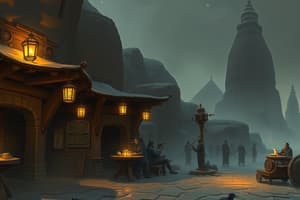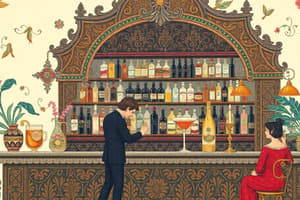Podcast
Questions and Answers
What were some of the earliest beverages likely made from?
What were some of the earliest beverages likely made from?
Fermented fruits, honey, and grains
When did tea cultivation begin in China?
When did tea cultivation begin in China?
Around 2700 BC
What significant breakthrough in beverage preservation was invented by Nicolas Appert?
What significant breakthrough in beverage preservation was invented by Nicolas Appert?
Canning
Who developed the process of pasteurization?
Who developed the process of pasteurization?
Which beverage was invented in 1886?
Which beverage was invented in 1886?
What role does a Bar Manager typically oversee?
What role does a Bar Manager typically oversee?
What are the primary responsibilities of a Head Bartender?
What are the primary responsibilities of a Head Bartender?
What is the role of a Barback?
What is the role of a Barback?
Which personnel is responsible for managing the wine list in high-end establishments?
Which personnel is responsible for managing the wine list in high-end establishments?
The cocktail shaker is used in bars to mix drinks by ________.
The cocktail shaker is used in bars to mix drinks by ________.
Flashcards are hidden until you start studying
Study Notes
History of Beverage Service
- Ancient beverages included fermented fruits, honey, and grains, with early wine production dating back to 7000 BC in China.
- Evidence of beer brewing in Mesopotamia and Egypt emerged around the same time period.
- Tea cultivation began in China circa 2700 BC, becoming global by the 10th century AD.
- Coffee consumption started in Ethiopia around the 9th century AD and spread to Europe in the 17th century.
- Early civilizations recognized clean drinking water's significance, employing boiling and filtration methods, as well as building aqueducts.
Industrial Revolution and Beyond
- Innovations such as canning, introduced by Nicolas Appert in 1809, and pasteurization developed by Louis Pasteur transformed beverage preservation.
- The first carbonated beverages emerged in the 18th century, with Jacob Schweppe’s mineral water being a notable example from 1783.
- Coca-Cola was invented in 1886, marking the rise of iconic soft drinks.
- The 20th century advanced packaging, enabling beverage companies to expand globally, establishing a vast array of consumer options.
- Current trends emphasize health and wellness, leading to demand for natural and organic beverages, as well as sustainable practices in production and packaging.
Bar Personnel
- Bar Manager: Oversees operations, manages staff and inventory, develops drink menus, and handles customer issues.
- Head Bartender/Bartender: Prepares and serves drinks, interacts with customers, maintains cleanliness, and ensures responsible alcohol service.
- Barback: Supports bartenders by stocking supplies, preparing garnishes, and maintaining hygiene standards.
- Server/Waiter: Takes orders, delivers food and drinks, and provides customer service in bars with food service.
- Wine Steward: Curates the wine list, recommends pairings, ensures proper storage and service, and may manage tastings and inventory.
Bar Tools and Equipment
- Cocktail Shaker: Essential for mixing drinks such as cocktails and mocktails through shaking.
Studying That Suits You
Use AI to generate personalized quizzes and flashcards to suit your learning preferences.




